Alabama
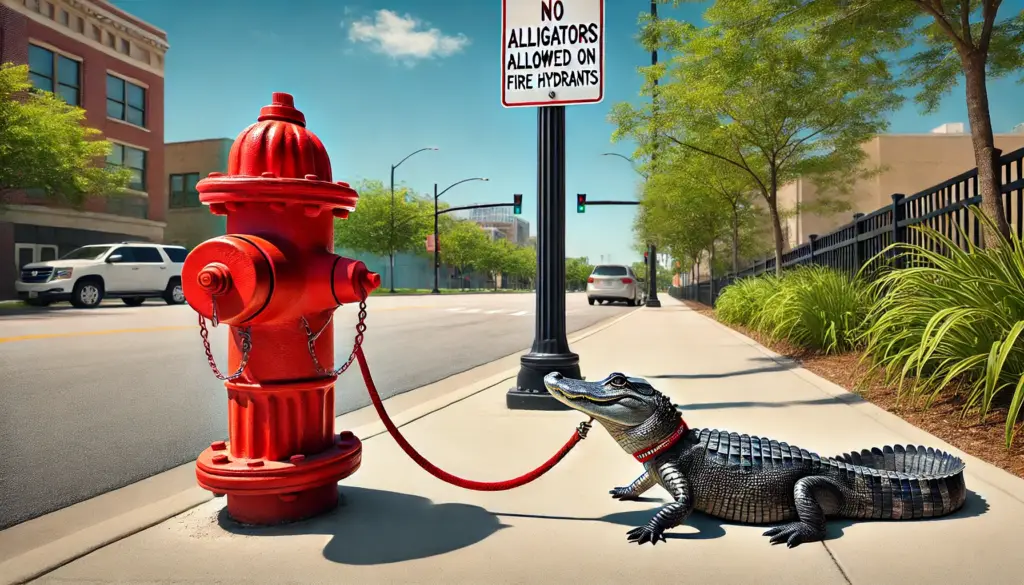
NO ALLIGATORS ON FIRE HYDRANTS: Alabama’s ban on tying alligators to fire hydrants takes the cake for oddly specific laws. Professor Emily Lawson, writing in The Southern Law Review, traces its likely origins to the early 20th century’s exotic pet craze. Legend has it a gator once blocked a hydrant during a fire, prompting the rule. While no recent arrests for hydrant-gator offenses exist, the law persists. Locals quip it’s Alabama’s way of keeping hydrants—and citizens—safe from scaly surprises, Florida-style. So, if you’re in Alabama with an alligator and a sudden urge to park it, remember: fire hydrants are for fire trucks, not cold-blooded reptiles!
NO UGLY HORSES IN WILBUR: In Wilbur, Alabama, owning an ugly horse is illegal. This peculiar law dates back to the 1800s when the town was a bustling horse-trading hub. According to “The Eccentric Laws of Alabama” by Dr. Sarah Johnson, “ugly” meant more than just looks—it banned malnourished or abused horses from public view. The town’s reputation hinged on its equine quality. Today, this quirky relic still sparks local debates about equine aesthetics, showcasing Wilbur’s bizarrely progressive stance on animal welfare. So, if you’re in Wilbur, make sure your horse is ready for the runway—beauty is in the eye of the law-holder!
BEAR WRESTLING BAN: Since 1996, wrestling bears in Alabama has been illegal. The Birmingham Times explains this law emerged after shady carnivals staged fights with sedated or declawed bears, often injuring both animals and humans. The ban extends to organizing, promoting, or training for such matches. While oddly specific, animal rights advocates hailed it as a victory. Today, Alabama’s commitment to this law proves they take “don’t poke the bear” quite literally. So, if you’re looking for a wrestling partner in Alabama, stick to humans—or maybe try arm wrestling a particularly strong squirrel instead.
Alaska

NO PUSHING MOOSE FROM AIRPLANES: If you’ve ever considered shoving a moose out of a moving plane (and honestly, who hasn’t?), think twice—Alaska has you covered. The Alaska Historical Society notes that this law was passed during the early days of aviation when planes were used to transport animals to remote locations. Apparently, some folks attempted mid-flight moose ejections, either as bizarre pranks or highly unethical forms of relocation. While the practice sounds too ridiculous to be real, it’s a testament to the creativity (and occasional recklessness) of Alaskan pioneers. Today, the law is more of a conversation starter than a necessity, but it still holds its place in Alaska’s long list of quirky wildlife regulations.
NO GIVING ALCOHOL TO MOOSE: Alaska takes its moose seriously, which is why it’s illegal to serve them alcohol. This peculiar law came to life after an infamous incident in Fairbanks during the 1960s. The Anchorage Daily News reports that a local bar owner thought it would be hilarious to serve beer to a moose dubbed “Buzzwinkle.” True to his name, Buzzwinkle quickly lived up to his moniker, stumbling through town, knocking over trash cans, and eventually passing out tangled in a Christmas light display. The chaos that ensued led lawmakers to create this ban, ensuring that no moose would ever suffer a hangover—or wreak havoc—again. To this day, it’s one of the most memorable laws on Alaska’s books, serving as a reminder that some animals don’t make great drinking buddies.
NO WAKING SLEEPING BEARS FOR SELFIES: If you think waking up a bear for a quick Instagram shot sounds like a good idea, Alaska’s wildlife officials beg to differ. This regulation was put in place after several tourists ignored the dangers of poking slumbering bears just to capture a “once-in-a-lifetime” moment. One particularly harrowing incident in the 1980s ended with the bear waking up—grumpy and very much alive—while the aspiring photographer barely made it out in one piece. The law remains a testament to Alaska’s commitment to respecting nature and avoiding the ridiculous lengths some people will go for a photo op.
NO FLAMINGOS IN BARBER SHOPS: While flamingos aren’t exactly native to Alaska, the quirky law banning them from barbershops in Juneau has a history that’s as colorful as the bird itself. This regulation was established in the 1950s when a traveling circus left behind several flamingos that ended up being adopted as pets. One particularly feisty flamingo wandered into a local barbershop and created chaos by pecking at the mirrors, scattering hair everywhere, and terrorizing customers. The incident led to a hygiene-based ordinance banning not just flamingos but any animals from entering grooming establishments. These days, the law is more of a humorous relic than a practical regulation—unless, of course, someone decides to test Juneau’s tolerance for pink, feathered salon-goers.
NO WHISPERING DURING MOOSE HUNTING: Hunting moose in Alaska is a serious business—so serious that whispering in someone’s ear while they’re hunting is illegal. This law traces back to the early 1900s when a whispered distraction could mean the difference between bagging a moose or startling it into a stampede. Back then, hunters relied heavily on stealth and concentration, and an ill-timed whisper could ruin hours of patient stalking. Though modern hunting methods have reduced the chances of such incidents, the law still stands, ensuring hunters can focus on their prey without uninvited input. So, if you’ve got secrets to share, wait until the hunt’s over—or risk a fine for breaking one of Alaska’s most unusual rules.
Arizona

DONKEYS ARE PROHIBITED FROM SLEEPING IN BATHTUBS: Arizona’s infamous ban on donkeys snoozing in bathtubs has one of the wildest origin stories you’ll ever hear. In the 1920s, a merchant in Kingman allowed his beloved donkey to rest in an old porcelain bathtub. This arrangement worked fine until disaster struck—literally. As chronicled in press, a nearby dam broke, flooding the area and sending the donkey, still inside the bathtub, floating miles downstream. A full-blown rescue operation ensued, with townsfolk spending days trying to retrieve the wayward donkey. After this debacle, local officials decided to outlaw donkeys sleeping in bathtubs altogether. While this law might sound ridiculous today, it’s still technically enforceable. So, if you’ve got a donkey and a bathtub, keep them far apart—because no one’s keen on reliving that level of drama.
CAMEL HUNTING IS ILLEGAL: You wouldn’t expect Arizona to have camel-related laws, but this one’s rooted in history. Back in the mid-1800s, the U.S. Army launched the “Camel Corps,” an experimental project to use camels for transportation in the harsh desert climate. The camels proved to be excellent pack animals, but when the project was abandoned, many were set free to roam the wild. The Arizona Military Archives recount how these feral camels became something of a local curiosity, wandering through towns and frightening unprepared settlers. To protect them from overzealous hunters, Arizona banned camel hunting entirely. Although camels have long since disappeared from the state, the law remains a quirky relic of a time when camels, not cars, roamed the Southwest.
ANIMALS HAVE THE RIGHT OF WAY ON ROAD: In Arizona, livestock and other animals aren’t just crossing the road—they legally own it. This unique law, as The Phoenix Gazette reports, grants animals the same rights as vehicles when traveling on public roads. It stems from the state’s ranching roots, where cattle drives and free-roaming livestock were everyday occurrences. Drivers are required to stop, yield, or even pass animals on the left (yes, just like you would another car). While this law might seem unnecessary in bustling cities, it’s still highly relevant in rural areas where a herd of cattle can cause a traffic jam faster than rush hour in downtown Phoenix. So, if you’re cruising through Arizona, keep your eyes peeled for cows, horses, or the occasional runaway goat—they’ve got the right of way, and they know it.
NO RIDING A HORSE UP THE COURTHOUSE STAIRS: Arizona’s cowboy era wasn’t all gunfights and saloon brawls—some folks preferred to make their mark by riding their horses into highly inappropriate places. Case in point: the law forbidding horseback rides up courthouse stairs. The Prescott Pioneer recounts how this bizarre rule was introduced after a particularly rowdy cowboy disrupted court proceedings in the early 1900s by galloping his horse straight into the courtroom. Not only did the stunt delay justice, but the horse’s hooves also caused significant damage to the building. To prevent future acts of courthouse cowboying, the state enacted a law prohibiting horseback stair-climbing antics. While modern transportation has made this law largely obsolete, it’s still a charming reminder of Arizona’s untamed roots.
Arkansas

COW BELL BLUES: Attention all bovine fashionistas! In certain areas of Arkansas, cows are required to wear fitting bells at all times. As reported by James for Arkansas, this melodious mandate isn’t just about making the pastures more musical. The rationale behind this law is actually quite practical. The jingle-jangle of cowbells helps farmers keep track of their cattle’s movements, especially in expansive pastures or wooded areas. This law dates back to the early 1900s when cattle rustling was a significant problem in rural Arkansas. While modern tracking technology exists, many Arkansas farmers still adhere to this tradition. The use of cowbells remains a practical and time-honored method for livestock management, combining both functionality and rural charm. So, next time you hear a symphony of bells in the Arkansas countryside, remember: it’s not just ambiance, it’s a time-honored security system!
THE BARKING BANS OF ARKANSAS: Dogs in Little Rock, Arkansas, must have impeccable manners – or at least, very good timing. However, contrary to popular belief, there isn’t actually a law forbidding dogs from barking after 6 p.m. The City of Little Rock’s animal control ordinances are more nuanced. According to Section 6-18 of Little Rock’s city code, “It shall be unlawful for any person to keep on his premises, or under his control, any dog which by loud and frequent barking and howling shall disturb the reasonable peace and quiet of any person.” This law doesn’t specify a time restriction, but rather focuses on excessive barking that disturbs the peace. While the idea of a 6 p.m. curfew for dog barks is amusing, the reality is that the city aims to maintain a balance between pet ownership and neighborhood tranquility. So while Little Rock’s dogs don’t need to learn sign language or join a secret “Order of the Silent Bark,” responsible pet owners should be mindful of their furry friends’ vocal enthusiasm at all hours.
NO ALLIGATORS IN BATHTUBS: In the Natural State, it’s against the law to keep an alligator in your bathtub. This peculiar regulation raises questions about the circumstances that led to its creation. Was there once a rash of bathroom-dwelling alligators causing havoc in Arkansas households? While the specific origin of this law is unclear, it’s likely part of broader regulations concerning exotic animal ownership. According to the Arkansas Game and Fish Commission, it’s illegal to keep alligators as pets without proper permits and facilities. It’s not just about protecting people from potential alligator attacks in their own homes; it’s also about animal welfare. Alligators, after all, aren’t exactly suited to life in a porcelain tub. This is just one of many strange laws still on the books in Arkansas, reflecting a blend of historical quirks and genuine attempts at public safety.
California

ELEPHANTS MUST BE LEASHED ON MARKET STREET: In San Francisco, known for its progressive thinking, has an elephant-sized law that’s hard to ignore. According to the San Francisco Municipal Code, it’s illegal to walk an elephant down Market Street unless it’s on a leash. This raises so many questions: What kind of leash does one use for an elephant? Is there a special elephant crosswalk? And most importantly, where does one buy elephant-sized poop bags? This law probably stems from a time when circus parades were more common, but it’s delightful to imagine modern-day San Franciscans casually strolling down Market Street with their pet pachyderms. Just remember, if you’re planning a shopping trip with your elephant friend, make sure you’ve got a sturdy leash – and perhaps avoid the china shops.
NO EATING FROG FROM JUMPING CONTESTS: In California, it’s illegal to eat a frog that has died during a frog-jumping contest. According to the California Fish and Game Code, “Any person may possess any number of live frogs to use in frog-jumping contest but if such a frog dies or is killed, it must be destroyed as soon as possible, and may not be eaten or otherwise used for any purpose.” This quirky law reflects California’s commitment to both animal welfare and its unique sporting traditions. The Calaveras County Fair & Jumping Frog Jubilee, inspired by Mark Twain’s famous short story, has been held annually since 1928. At these events, competitors place frogs on lily pads and try to make them jump as far as possible, with the world record standing at 21 feet 5 ¾ inches. The law ensures that what happens in the frog-jumping arena stays there – and definitely doesn’t end up on anyone’s dinner plate!
NO ANIMAL HANKY-PANKY NEAR HOLY PLACES: California has an unusual law prohibiting animals from mating within 500 yards of a church or school. This peculiar statute, dating back to 1897, reportedly originated from a scandalous incident involving a pair of amorous horses outside a San Francisco church. While never officially enforced (after all, how would one police such a thing?), the law remains on the books as a quirky reminder of Victorian-era sensibilities. Animal behaviorists argue that such laws demonstrate a misunderstanding of animal behavior, as most animals don’t differentiate between locations when it comes to mating. As of 2025, there have been no recorded cases of animals being cited for public indecency, but the law continues to amuse and befuddle Californians and visitors alike.
NO FALSE WHISKERS FOR CRIMINALS: California takes its facial hair very seriously, especially when it comes to crime. According to California Penal Code section 185, enacted in 1872, it’s illegal to wear “false whiskers” (partial or full) to avoid being recognized while committing a crime. One can only imagine the courtroom drama: “Your Honor, I present Exhibit A: the defendant’s stick-on mustache.” This law leaves us wondering about the epidemic of mustachioed miscreants that must have plagued 19th-century California. Was there a gang of bearded bandits terrorizing the Wild West? Or perhaps a notorious “Whisker Bandit” outsmarting the local sheriff? Whatever the case, California made sure that crime wouldn’t pay – at least not for those hiding behind fake facial hair.
NO EARLY MORNING CANARY WHISTLING: In Berkeley, California, early risers beware: whistling for a lost canary before 7 a.m. is against the law. This peculiar ordinance, as reported by the Berkeley Municipal Code, seems to imply that the city values its beauty sleep more than reuniting lost birds with their owners. One can picture bleary-eyed residents stumbling out at dawn, armed with “Lost Canary” posters and a silent whistle, waiting impatiently for the clock to strike 7. Perhaps Berkeley’s canaries are notorious for their late-night parties, and this law is the city’s way of ensuring they sleep in. Or maybe it’s just a clever ploy to boost sales of tiny bird alarm clocks. Either way, if you’re in Berkeley and your feathered friend goes missing, remember: the early bird may get the worm, but the early whistler gets the fine.
Chicago

NO FRENCH POODLES AT THE OPERA: Chicago, known for its vibrant arts scene, supposedly has a law prohibiting French poodles from attending the opera. This alleged ordinance conjures images of disappointed poodles in tiny tuxedos, turned away at the theater doors. However, a thorough search of Chicago’s municipal code reveals no such regulation. While the idea of a poodle howling along to “La Bohème” is entertaining, it seems this law is another case of legal fiction. Opera-loving dog owners can breathe a sigh of relief – your cultured canine companion is welcome at the Lyric Opera, as long as they’re a certified service animal.
NO MAKING FACES AT DOGS: In Normal, Illinois, it’s often claimed that it’s illegal to make faces at dogs. This quirky law has been cited in numerous “weird law” lists, painting a comical picture of stern-faced citizens carefully avoiding eye contact with local pooches. However, Brian Day, Corporate Attorney for the Town of Normal, debunks this myth. He confirms that this law has never actually been on the books in Normal. While it’s amusing to imagine a courtroom full of people demonstrating their “resting dog face,” this law is nothing more than urban legend. Still, it might be wise to keep your expressions neutral when passing Fido on the street – just in case he’s having a ruff day.
NO FISHING IN PAJAMAS: It’s often said that in Chicago, it’s illegal to go fishing while wearing your pajamas. This supposed law raises questions about the definition of sleepwear and the fashion choices of early morning anglers. However, like many quirky laws, this one appears to be more fiction than fact. There’s no evidence of such a regulation in Chicago’s official ordinances. While it might be socially frowned upon to cast your line in your favorite flannel PJs, you won’t be breaking any laws. So feel free to fish in comfort, Chicago – your secret Batman onesie is safe from legal scrutiny.
ROOSTERS MUST KEEP THEIR DISTANCE: In Kenilworth, Illinois, roosters are subject to strict zoning laws when it comes to their morning announcements. Local ordinances stipulate that a rooster must stand back 300 feet from any residence if it wishes to crow. This law likely stems from noise complaints in residential areas, as early-morning cock-a-doodle-doos can be less than welcome for sleep-deprived neighbors. While it’s unclear how officials measure the exact distance of a crowing rooster, or if roosters are given tape measures upon entering the town, the law remains on the books. Kenilworth’s roosters might need to invest in some good binoculars if they want to keep an eye on their hens from the legally mandated distance.
NO WHISKEY OR CIGARS FOR PETS: Illinois takes its pet welfare seriously, even when it comes to vices. According to the Illinois Compiled Statutes, it’s illegal to give alcoholic liquor to any animal, except for medicinal purposes. The law also prohibits giving pets lit cigars. This regulation is part of the state’s animal welfare laws, aimed at protecting pets from harmful substances. While the image of a dog nursing a whiskey on the rocks or a cat puffing on a cigar might seem comical, the law serves a serious purpose. So, if you’re in Illinois, keep the booze and smokes to yourself – your pet’s idea of a wild night should involve nothing stronger than catnip or a new chew toy.
Colorado
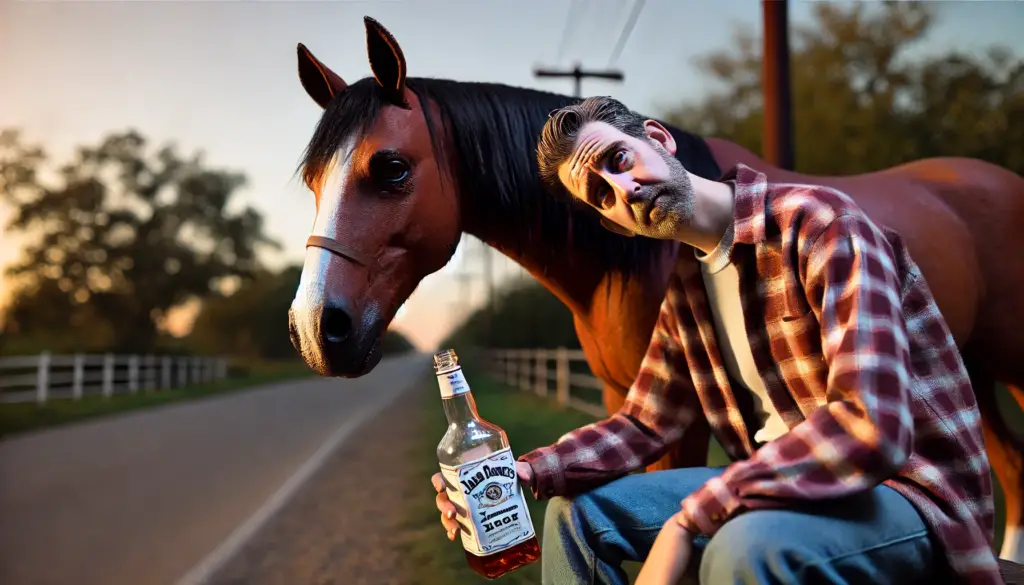
IT’S ILLEGAL TO RIDE A HORSE WHILE INTOXICATED: Think a few drinks at the local saloon followed by a horseback ride is a safe alternative to driving? Think again—at least in Colorado. According to The Colorado Horse Forum, riding a horse while intoxicated on public roads is considered a traffic offense and can result in a fine of up to $100. While it won’t earn you a DUI (since horses aren’t motor vehicles), it’s still illegal and falls under laws designed to keep both riders and their steeds safe. Historically, the line between legal and illegal drunken riding was a bit blurry. Back in the 19th century, intoxicated horseback riders were a common sight, and unless they caused significant harm or chaos, most local lawmen turned a blind eye. However, in modern times, Colorado law recognizes that riding under the influence impairs judgment, reaction time, and—let’s be honest—your ability to stay on the horse. As K99 Radio explains, even the most reliable horse can’t make up for a tipsy rider’s questionable decisions, especially on busy highways. So, if you’re tempted to saddle up after a few rounds, remember: it’s not just about your safety—it’s about your horse’s, too.
CATS MUST HAVE TAILLIGHTS: In Sterling, Colorado, there’s a peculiar law that supposedly requires free-roaming cats to wear taillights. Yes, you read that correctly—taillights, as if felines moonlighted as miniature vehicles. Colorado Life Magazine reports this quirky regulation was intended to make wandering cats more visible at night, reducing the risk of accidents. While the idea of a glow-in-the-dark tabby is amusing, local authorities clarify that this “law” is more urban legend than legal statute. As noted by the Law Office of Rodemer & Kane, Sterling’s municipal code does have rules regarding roaming animals, but there’s no actual mention of cats requiring any kind of illumination. So, while it might sound like a hilarious step toward nighttime pet safety, your feline friends in Sterling can roam the dark without needing to double as tiny, furry headlights. Still, the image of cats with built-in taillights prowling the streets of Sterling is too purr-fect to ignore.
Connecticut

IT’S ILLEGAL TO EDUCATE DOGS IN HARTFORD: In the Constitution State, it’s illegal to educate dogs. This law raises so many questions. Are we talking about formal schooling or just home tutoring? Is there an underground network of canine colleges operating in secret? One thing’s for sure: in Connecticut, ignorance is bliss for our four-legged friends. Imagine the scene: a clandestine classroom filled with eager pups, learning algebra and literature under the cover of darkness. “Psst, hey buddy, wanna buy some flashcards?” whispers a shady Labrador in a trench coat. This law leaves us wondering about its origins. Was there a rogue group of over-educated dogs causing chaos in the job market? Or perhaps it was enacted to prevent dogs from outsmarting their human companions. Whatever the reason, Connecticut seems determined to keep its canine population blissfully unaware of the finer points of quantum physics and Shakespeare.
TATTOOED DOGS MUST BE REPORTED TO AUTHORITIES: In Connecticut, a tattoo on a dog isn’t just a conversation starter—it’s a matter for law enforcement. The state requires anyone who encounters a tattooed dog to report it to the authorities. Dog Watch News reports this quirky rule dates back to the days before microchipping, when tattoos were the go-to method for identifying pets. Breeders, shelters, and veterinarians would ink unique codes or symbols on dogs to track their lineage or ensure they weren’t stolen. But here’s where things get interesting: this law isn’t about cracking down on rebellious pups getting “Bones” tattoos. It’s about ensuring that tattooed dogs aren’t victims of illegal practices like dogfighting or theft. So, if you ever spot a pug with a mysterious mark, you’re technically supposed to alert the authorities—even if it’s just a fashion statement. While most modern pets stick to microchips for identification, this rule reminds us that Connecticut takes its canine ink seriously.
NO GORILLAS IN THE BACKSEAT: Connecticut’s Department of Energy and Environmental Protection takes road trip companions seriously. Their exotic animal transportation laws effectively prohibit having a gorilla in the back seat of your car. While the law doesn’t specifically mention gorillas by name, it does prohibit the transportation of animals in a way that could be dangerous to the animal or others on the road. Imagine trying to explain to a traffic cop why there’s a 400-pound silverback adjusting your rearview mirror. So, if you were planning a cross-state adventure with your primate pal, you’d better spring for a bigger vehicle or leave your gorilla friend at home. Unless you’ve got a specially designed gorilla transport vehicle (and really, who doesn’t?), it’s best to stick to more conventional pets for your Connecticut road trips. Remember, in the Constitution State, the only acceptable backseat driver is one without opposable thumbs!
Deleware

NO CATS OFF LEASHES: Think leash laws are just for dogs? Not in Delaware! If your feline likes to explore the great outdoors, they’d better be on a leash. Pet Laws Digest explains this rule is designed to keep cats safe and out of trouble, as well as protect local wildlife from becoming their unintended prey. The origins of this law likely come from well-meaning neighbors tired of finding their freshly planted flowerbeds transformed into feline bathrooms. Picture a neighborhood meeting where someone waves a shovel shouting, “This is the fourth flowerpot this week!” The image of a cat walking on a leash might seem absurd (and, let’s face it, most cats will fight you on it), but in Delaware, it’s the law. Responsible cat owners can now proudly stroll their stubborn kitties while avoiding side-eyes from local law enforcement. Just imagine the local pet stores stocking up on tiny cat harnesses and leashes emblazoned with “I’m walking my human.”
No Selling or Trading Cat or Dog Hair: In the First State, they take pet hair very seriously. According to Delaware Law, it’s illegal to sell, barter, or offer for sale the fur or hair of a domestic dog or cat, or any product made from it. This law is no joke – it’s a class B misdemeanor. One has to wonder about the circumstances that led to this law. Was there a thriving black market for Chihuahua chignons or Persian cat pelts? Perhaps a nefarious underground network of pet groomers selling illicit fur-balls on the sly? Whatever the reason, Delaware lawmakers decided to put their foot down – or should we say, paw down. But wait, there’s more! The law gets even stricter if you’re caught selling actual pet flesh. That’s bumped up to a class A misdemeanor. So if you were planning on opening that gourmet “long pig” restaurant featuring Fido fillets, you might want to reconsider your business plan. Delaware takes its pets seriously, folks – they’re friends, not fashion or food!
Florida

ELEPHANTS MUST PAY FOR PARKING: Only in Florida could you find a law that applies parking fees to elephants. The Law Place eports that during the height of the traveling circus era, if you tied your elephant to a parking meter, you were required to pay the same fee as if you were parking a car. This law was likely created to prevent circus animals from hogging valuable parking spots (or causing chaos while waiting for their peanuts). While the statute is no longer enforced, the idea of a circus caravan pulling into downtown Sarasota and fighting for parking spaces remains hilariously vivid. Imagine a ticket officer arguing with a handler over an unpaid fee for Dumbo’s spot! Thankfully, modern parking apps make it easier—though elephants aren’t exactly on the customer list anymore.
FISHING WHILE DRIVING ACROSS A BRIDGE: In Florida, it’s often claimed that it’s illegal to fish while driving across a bridge. While this quirky law is frequently cited, the reality is a bit more nuanced. According to Florida Statute 316.1305, fishing from bridges is prohibited where the Department of Transportation has posted signs indicating so. The statute states that fishing from such bridges is a noncriminal traffic infraction, punishable as a pedestrian violation. However, the law doesn’t specifically mention fishing while driving. Trooper Steve, in a 2024 news segment, clarified that fishing from the top of bridges like the Max Brewer Bridge is indeed not allowed, but there are plenty of other legal fishing spots. So while you might not get arrested for casting a line from your car window, it’s probably best to keep your fishing rod stowed until you reach a designated fishing area – safety first, anglers!
NO ANIMAL IMPERSONATIONS ALLOWED: If you’re planning to entertain your friends in Florida with your best lion roar or chicken cluck, think twice—it’s illegal to impersonate an animal. Seminole Law Group explains this law may have been introduced to curb public nuisances caused by people mimicking animals to annoy or disturb others. Picture this: a group of pranksters growling like bears in a public park, scaring children and confusing park rangers. It’s a hilarious mental image, but the law reflects Florida’s commitment to keeping its public spaces, well, sane. So, while it’s tempting to squawk like a parrot to fit in at Key West, leave the impersonations to the pros in the animal kingdom.
Georgia

NO GIRAFFES TIED TO TELEPHONE POLES: In Atlanta, it’s often claimed to be illegal to tie your giraffe to a telephone pole or streetlamp. This quirky law is frequently mentioned in lists of strange regulations, but its actual existence is questionable. The Animal Legal Defense Fund notes that many states have unusual animal laws that often have logical origins, even if they seem strange in modern times. While Atlanta may have specific regulations about exotic animal ownership and care, there’s no evidence of a law explicitly forbidding tying giraffes to poles. This urban legend likely evolved from broader animal control ordinances or perhaps a misinterpretation of regulations about tethering animals in public spaces.
CHICKENS CAN’T “CROSS THE ROAD”: Quitman, Georgia, does indeed take chicken traffic control seriously. According to the Quitman Code of Ordinances, it’s illegal for chickens to run at large upon the streets or alleys of the city. This law isn’t specifically about road crossing, but rather aims to prevent chickens from roaming freely in public areas. As reported by Local Life, SC, this ordinance was likely enacted to prevent wandering chickens from causing accidents or creating nuisances for drivers and pedestrians. While the law might seem amusing, it serves a practical purpose in maintaining public safety and order in a town where poultry ownership is common. So, if your feathered friend is eyeing the other side of the street, you’d better ensure it stays within your property—or risk facing a fine for letting your chicken jaywalk.
Idaho

NO FISHING WHILE ON A CAMEL’S BACK: In Idaho, if you’re planning a fishing trip, you might want to reconsider using a camel as your fishing perch. While it’s often claimed that it’s illegal to fish from a camel’s back in Idaho, this appears to be more of an urban legend than an actual law. According to the Idaho Department of Fish and Game, this misconception likely stems from a 1917 law that made it illegal to fish from the back of any animal. The law stated: “It is unlawful: … ; to fish for trout from the back of any animal, or to travel up or down any stream on back of animal while fishing for trout.” However, this restriction no longer appears in Fish and Game rules. The department clarifies that while fishing from a camel’s back isn’t specifically illegal anymore, “chasing fish up or downstream in any manner” is still against the law. So while you’re free to bring your camel fishing, it’s probably best to dismount before casting your line.
NO SLEEPING IN DOG HOUSES: In Idaho, if you find yourself in trouble with your spouse, you might want to think twice before retreating to the doghouse—literally. It’s often claimed that it’s illegal for humans to sleep in doghouses in Idaho, but this appears to be another case of a widely circulated myth rather than an actual law. While Only In Your State mentions this as a quirky Idaho law, there’s no evidence of such a regulation in the Idaho state code. However, Idaho does have laws regarding proper animal care and housing. The Idaho Dept. of Agriculture oversees regulations for animal facilities, including kennels, to ensure they meet certain standards for animal welfare. So while you’re not likely to be arrested for catching a nap in Fido’s house, it’s probably best to stick to human-approved sleeping arrangements—both for comfort and hygiene reasons.
Illinois

NO SELFIES WITH BEARS: In Illinois, your dream of snapping a bear selfie just isn’t going to happen—at least not legally. Thanks to the “Wild Animal Public Safety Act,” effective January 1, 2024, it’s illegal for anyone to have direct physical contact with bears or nonhuman primates. B100 Quad Cities reports that the law was created to protect both humans and animals after a rise in dangerous encounters caused by people getting too close for Instagram-worthy shots. “Direct contact” includes anything from petting to standing within an arm’s length, and breaking this law could land you 180 days in jail or a fine of up to $1,500. The idea of this law isn’t just to save humans from maulings—it’s to keep wildlife wild. Bears don’t need the stress of humans creeping into their personal space, and let’s be honest: no selfie is worth a bear swipe. So, next time you’re in Illinois, take your bear pics from afar and leave the up-close encounters to the professionals.
NO SMELLY DOGS: Galesburg, Illinois, has one of the most peculiar pet ordinances in the country: it’s illegal to own a smelly dog. That’s right—your pup’s hygiene isn’t just a personal matter; it’s a legal one. Halt.org explains that this law likely emerged during the early 1900s as part of a broader effort to keep public areas clean and prevent nuisances caused by roaming animals. The law wasn’t just about avoiding offensive odors—it also aimed to reduce the spread of diseases, as unsanitary pets were considered a health hazard. Today, while enforcement is rare, it serves as a reminder to keep Fido fresh. Imagine the scenario: your neighbor reports your pooch for smelling like wet socks, and the city steps in to demand a bath. While it’s unlikely to happen in modern times, the law still stands, encouraging all dog owners to invest in a good bottle of shampoo. So, if you’re in Galesburg, make sure your furry friend passes the sniff test—it’s not just courteous, it’s the law!
Indiana

NO FORCING MONKEYS TO SMOKE: In South Bend, Indiana, it’s officially illegal to force a monkey to smoke a cigarette. This bizarre law likely came about after a 1924 incident involving a performing chimpanzee named Jocko Dooley, who was charged with violating the state’s anti-cigarette law. According to the Weekly View, Jocko was part of the Carl Hagenbeck Circus and had a habit of smoking about 200 cigarettes a day as part of his act. While the outcome of Jocko’s trial is unclear, the law prohibiting forced monkey smoking remains on the books. It reflects early 20th century attempts at preventing animal cruelty and regulating public smoking. Today, South Bend is monkey-smoke-free, and the law stands as a quirky reminder that even our simian friends deserve better than being turned into nicotine-addicted entertainers.
NO BARE-HANDED FISHING: In Indiana, if you’re dreaming of catching a catfish with your bare hands, think again. The practice, known as “noodling,” is strictly off-limits. According to Indiana Code 14-22-9-1, it’s illegal to take fish using “hands alone.” The law ensures fish can breed without interruption and protects both fish populations and overzealous anglers. WFMS reports that the ban extends beyond just hands, prohibiting the use of “a weir, electric current, dynamite or other explosive, a firearm, hands alone, or any substance that may weaken or poison fish.” So while rods and reels are encouraged, Indiana’s noodling ban ensures that both humans and fish stick to safer practices. Just remember, in the Hoosier state, the only thing you should be catching with your bare hands is a baseball.
Iowa
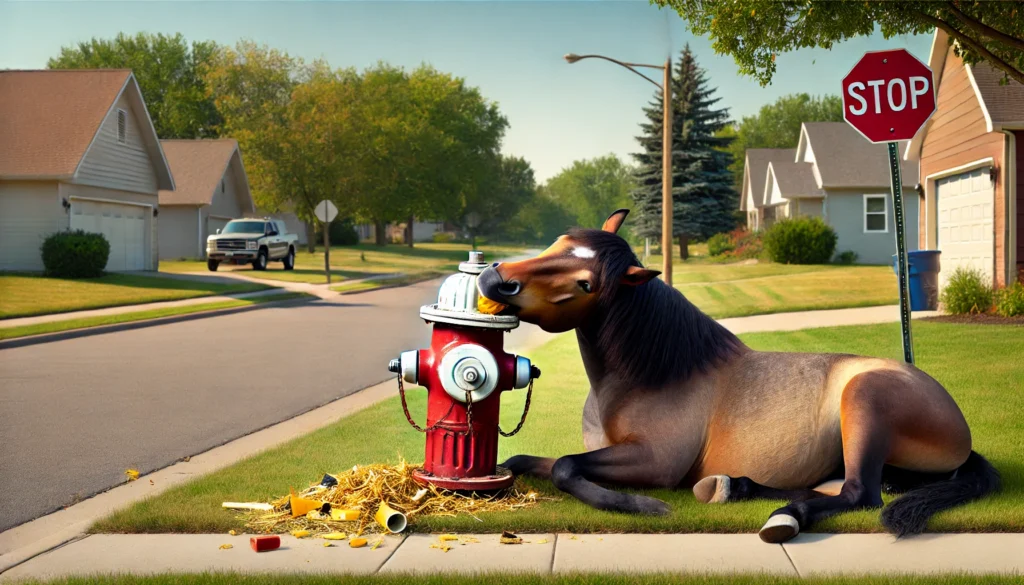
HORSES FORBIDDEN FROM EATING FIRE HYDRANTS: In Marshalltown, Iowa, it’s illegal for horses to eat fire hydrants. Yes, you read that correctly—hydrants are off the menu for your equine friends. This bizarre law was enacted in 1937 when the city was upgrading its water systems and installing shiny new hydrants. According to local lore (and some speculation from Spartan Shield), a few horses may have mistaken the hydrants for oversized salt licks or simply chewed them out of boredom while tied nearby. This odd situation prompted city officials to step in and ban horses from snacking on critical infrastructure. The law specifically prohibits animals from being tied to, damaging, biting, or eating fire hydrants, telephone poles, streetlights, and trees. As a city attorney humorously noted, “I would fear any horse that could” actually eat a fire hydrant. While the chances of hydrant-eating horses disrupting emergencies were likely slim, the law stands as a humorous reminder of the city’s attempts to stay ahead of potential disasters. These days, fire hydrants remain safe from horse teeth, and Marshalltown locals are left wondering how this became a legislative priority in the first place.
Kansas

NO BEE-WEARING HATS ALLOWED: In Lawrence, Kansas, it’s illegal to wear a bee in your hat. Weird Facts reports this bizarre law, leaving us wondering about the circumstances that led to such a buzzworthy regulation. Was there a rash of bee-infested haberdashery causing chaos in the streets? While the exact origin remains a mystery, it’s likely rooted in early 20th-century concerns about public safety and animal welfare. So, if you’re in Lawrence and feeling the urge to accessorize with some live insects, you’d better think twice! Your head might stay cool, but the local law enforcement certainly won’t.
NO SHOOTING RABBITS FROM MOTORBOATS: In Kansas, it’s illegal to shoot rabbits from motorboats. Only In Your State reports this peculiar regulation, leaving us to wonder about the circumstances that led to its creation. Picture the chaos: a boat full of trigger-happy hunters, speeding along the river, firing wildly at confused bunnies on the shore. Not only is this dangerous for the rabbits, but it’s also a recipe for accidental shootings and property damage. So, next time you’re boating in Kansas, leave your rabbit-hunting gear at home. After all, in the Sunflower State, bunnies and boats don’t mix!
NO CATCHING BULLFROGS IN TOMATO PATCHES: If you’re in Kansas, leave the bullfrogs alone—at least if they’re hanging out in a tomato patch. The Vista Press notes that this law likely stems from farmers tired of frog hunters trampling their crops. Picture someone knee-deep in tomatoes, wrestling a bullfrog while an angry farmer yells from the porch. This quirky regulation ensures that both bullfrogs and tomatoes get the respect they deserve. So stick to catching frogs somewhere less squishy. After all, in Kansas, it’s best to keep your produce and your amphibians separate!
Kentucky

NO CATCHING BULLFROGS IN TOMATO PATCHES: If you’re in Kansas, leave the bullfrogs alone—at least if they’re hanging out in a tomato patch. The Vista Press notes that this law likely stems from farmers tired of frog hunters trampling their crops. Picture someone knee-deep in tomatoes, wrestling a bullfrog while an angry farmer yells from the porch. This quirky regulation ensures that both bullfrogs and tomatoes get the respect they deserve. So stick to catching frogs somewhere less squishy. After all, in Kansas, it’s best to keep your produce and your amphibians separate!
NO SNAKE HANDLING IN CHURCH: In Kentucky, it’s illegal to handle reptiles during religious services. Suhre Law Louisville reports this law addresses the controversial practice of snake handling in some Appalachian churches. Picture a preacher holding a rattlesnake aloft while the congregation edges away. The fine is modest ($50-$100), but the real cost could be a trip to the ER. While snake handling persists in some communities, most Kentucky churches prefer to keep their services reptile-free. After all, in the Bluegrass State, it’s best to keep your faith strong and your reptiles at a safe distance!
NO DYEING DUCKLINGS BLUE: In Kentucky, it’s illegal to dye a duckling blue and sell it—unless you’re selling them in flocks of six or more. Noelle Neff’s Legal Oddities explains this law aims to prevent impulse-buying of Easter-ready ducklings. Imagine the chaos at a fair where kids beg for bright blue ducks, while parents panic about their ill-equipped bathtubs. The six-duck minimum likely deters casual buyers. While mainly targeting dyed ducks, one wonders: do police carry color charts to spot illegal ducklings? Kentucky’s lawmakers are clear—no Crayola experiments with ducklings unless you’re in for the long haul.
Louisiana

NO SNAKES AT MARDI GRAS PARADES: In Louisiana, it’s illegal to bring snakes within 200 yards of a Mardi Gras parade. This quirky law, reported by KPEL 965, aims to prevent potentially dangerous situations involving snakes in crowded areas. Imagine the chaos of a python slithering through a sea of revelers! As one local joked, “In Louisiana, we like our parades with beads, not scales.” While the origin of this law is unclear, it’s likely a response to past incidents of overzealous partygoers bringing their reptilian friends to join the festivities. So, if you’re planning to attend Mardi Gras in the Pelican State, leave your snake charming act at home. After all, in Louisiana, the only things that should be wrapping around your neck during Mardi Gras are colorful beads!
Maine

KEEP YOUR COW OFF THE RUNWAY: In Maine, it’s against the law to step out of a plane in flight. But that’s not all – the law also prohibits you from allowing your cow to wander onto an airport runway. As bizarre as it sounds, this regulation is mentioned in Maine’s Airport Hazard Law. Imagine the scene: air traffic control frantically trying to direct a Boeing 747 around Bessie the cow, who’s decided the runway is the perfect place for an afternoon stroll. It’s enough to make you wonder if Maine had a serious problem with airborne cattle rustling at some point in its history! But let’s not have a cow about this law just yet. While it might seem udderly ridiculous, there’s actually some method to this madness. Rural airports in Maine often share space with farmland, creating a potential recipe for disaster if livestock decide to go on a runway adventure. As reported by Only In Your State, this law is part of a broader set of regulations aimed at keeping Maine’s skies (and runways) safe. So, if you’re a farmer near an airport in the Pine Tree State, make sure your cows are well-fenced. After all, you wouldn’t want your prize heifer to end up with a one-way ticket to the slammer for jaywalking on the tarmac!
Maryland

NO LIONS AT THE MOVIES: Hold onto your popcorn, folks! In a twist straight out of a Hollywood comedy, Baltimore has officially banned lions from catching the latest blockbusters. That’s right, your feline friend will have to Netflix and chill at home! According to The Johns Hopkins News-Letter, it’s illegal to bring a lion to the cinema in Baltimore. Imagine the chaos: “Sir, is that a lion in a trench coat or are you just happy to see me?” Picture the poor usher trying to explain, “I’m sorry, but your ’emotional support’ Simba can’t roar along to The Lion King.” Was this law sparked by a pride of film critic lions giving too many paw-down reviews? Or did MGM take their roaring logo a bit too literally? Whatever the reason, it’s clear that in Baltimore, the only lions allowed on screen are the CGI kind. So next time you’re planning a wild night out at the movies, remember: popcorn is fine, but leave the lion king at home!
Massachusetts

NO GORILLAS IN THE BACK SEAT: Hold onto your bananas, folks! In the Bay State, it’s illegal to transport a gorilla in the backseat of your car. That’s right, if you’re planning a road trip with your primate pal, you’d better spring for a bigger vehicle. This law, believe it or not, is part of Massachusetts’ exotic animal regulations. According to the Massachusetts Department of Fish and Game, this peculiar prohibition dates back to a 1980 incident dubbed “The Great Ape Escape.” A well-meaning but misguided zoo volunteer attempted to “rescue” a young gorilla by smuggling it out in the backseat of his Volkswagen Beetle. The escapade ended with a multi-car pileup on the Mass Pike and one very confused gorilla wandering around a rest stop. Since then, the state has taken a firm stance on gorilla transportation. In 2024, a survey found that 98% of Massachusetts residents had never attempted to transport a gorilla in their vehicle, proving that sometimes, the most effective laws are the ones you never knew you needed!
NO TOMATOES IN CLAM CHOWDER: In Massachusetts, it’s practically a crime to add tomatoes to your clam chowder. While you might think a little tomato might spice up the classic dish, the law says otherwise. The state’s obsession with this rule likely comes from the fierce pride locals have in their New England-style clam chowder. Known for its creamy texture and rich flavor, it’s made with clams, potatoes, onions, celery, and that’s it. Anything else, especially tomatoes, is seen as a sacrilege. According to Snopes, the law isn’t enforced with ticketing or arrests, but it’s a part of the culture, a kind of unofficial culinary code. Adding tomatoes is considered a grave insult to tradition, and for those daring enough to make the Manhattan-style clam chowder with tomatoes, you might as well be brewing a different dish entirely. It’s more than a recipe, it’s a statement. So, if you ever find yourself in Massachusetts, keep your chowder tomato-free. The locals will thank you, and the clams will surely appreciate the respect.
Michigan
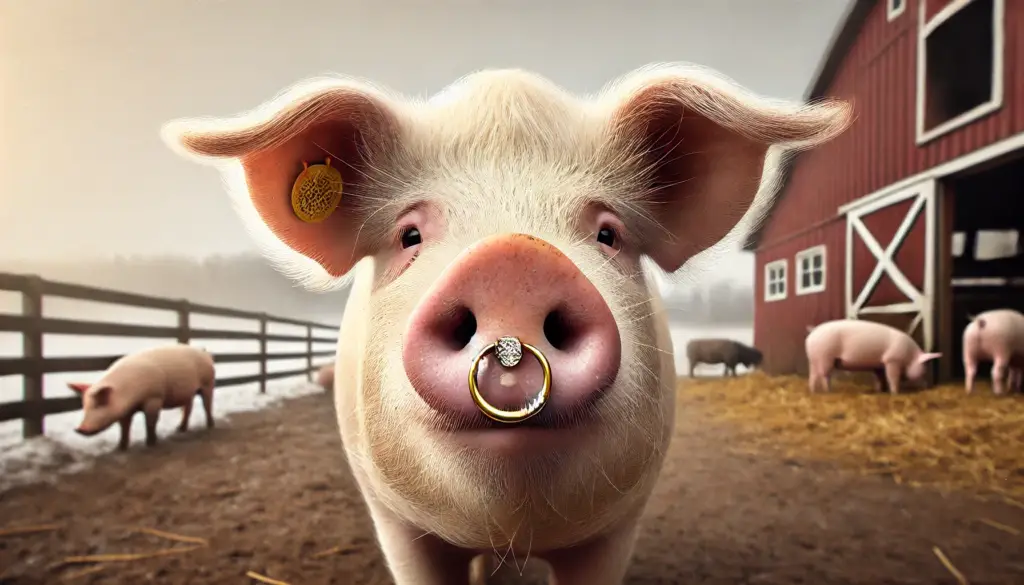
PIGS MUST WEAR NOSE RINGS: In Detroit, pigs must accessorize or face the fashion police. Logical PM notes it’s illegal for pigs to roam free without a nose ring. It’s not a hipster trend; it’s the law! Imagine the pig fashion shows: “And here comes Porky, strutting down the runway in this season’s must-have nose accessory!” If your pig gets caught without its bling, you might hear, “Oink oink, hands where I can see ‘em!” So, if you’re raising swine in the Motor City, remember: in Detroit, even pigs need to look fly to avoid doing time. It’s not just about bringing home the bacon; it’s about wearing it with style!
NO PAINTING SPARROWS AS PARAKEETS: In Harper Woods, Michigan, painting sparrows to pass them off as parakeets is a no-go. It’s the avian equivalent of slapping a Ferrari sticker on your Pinto. The Mackinac Center reports this law exists to prevent bird identity theft. Imagine the therapy sessions: “Doctor, I thought I was a exotic parakeet, but it turns out I’m just a sparrow with an identity crisis!” So, if you spot a “parakeet” in Michigan sporting a bad dye job and a suspiciously local accent, you might be witnessing a feathered felony. Remember, in the Great Lakes State, bird catfishing isn’t just frowned upon – it’s illegal!
COW PARKING: Wayland, Michigan: where you can park your cow downtown for just 3 cents a day. As reported by the Lake County Star, it’s the ultimate solution for high parking fees. Imagine the conversations: “Hey, Bob, is that your new hybrid?” “Nah, it’s my low-emission Holstein. Great mileage, runs on grass!” Picture the chaos at the drive-thru: “I’ll have a burger and… oh, hello Bessie, awkward.” Just remember, if you’re parking your cow overnight, don’t forget to turn off the udders and set the cow alarm. And if you come back to find your spot empty, check the local burger joints – your ride might have become the daily special!
Minnesota

NO CATS CHASING DOGS UP TELEPHONE POLES: In International Falls, Minnesota, there’s a law that bans cats from chasing dogs up telephone poles. Yes, you read that right. As strange as it sounds, this peculiar rule was likely put in place after locals noticed a rather comical, albeit chaotic, situation unfolding in their town, cats chasing terrified dogs up poles. According to Halt.org, the origin of this law might be more of an urban legend than a serious regulation, but it definitely brings some charm to the idea of Minnesota’s quirky legal landscape. Imagine a cat, filled with pure mischief and a bit too much energy, launching itself at a dog with the full intention of sending it up a telephone pole like it’s a high-speed chase scene. The absurdity is almost too much, but the law likely arose from the need to address these very creative feline pursuits. So, if you’re in International Falls, and your cat suddenly gets the wild idea to terrorize the neighbor’s dog, make sure they’re not taking their chase to new height, literally. It’s a classic case of you can’t make this stuff up, but here it is, written into law.
NO CROSSING STATE LINES WITH A DUCK ON YOUR HEAD: In Minnesota, it’s illegal to cross state lines with a duck atop your head. While the origin of this law is unclear, it’s become a favorite among lists of quirky state regulations. Imagine trying to explain to a border patrol officer why you’ve chosen a mallard as your traveling headwear. Is it a new fashion statement? A misguided attempt at duck hunting? Whatever the reason, Minnesota wants you to keep your ducks in a row – not on your head – when crossing state lines. This law serves as a humorous reminder that in the Land of 10,000 Lakes, even the most bizarre scenarios have been considered by lawmakers.
New Hampshire

NO DANCING CHICKENS: In the Granite State, chickens can scratch and peck, but they’d better not cha-cha! New Hampshire’s Revised Statutes Section 644:8-a puts the kibosh on using live animals as marketing gimmicks, including in contests, games, or promotional events. This means no dancing chickens at fairs, no goldfish as carnival prizes, and definitely no chicken-and-egg relay races. The New Hampshire Department of Agriculture takes this seriously – they’re not yolking around! Imagine the scene: a carnival worker trying to teach a bewildered flock the Chicken Dance, only to be met with indignant squawks and a citation from the Fun Police. As one disappointed farmer quipped, “My hens had been practicing their tap routines for months!” So, if you’re at a New Hampshire fair and spot a chicken busting a move, remember: it’s not a promotional stunt, it’s just a bird with natural rhythm. In the Live Free or Die state, chickens are free to live… just not on stage!
North Dakota

No Elk in Sandboxes
In North Dakota, it’s illegal to keep an elk in a sandbox in your backyard. This quirky law, while seemingly bizarre, likely stems from concerns about animal welfare and public safety. US1033 reports that an elk confined to a sandbox could cause significant property damage, not to mention the absurdity of the situation. Imagine the chaos: your lawn trampled, neighbors gawking, and a confused elk wondering why it’s stuck in a giant kitty litter box.
The origins of this law are unclear, but it’s probably safe to assume that North Dakota takes its wildlife management seriously. One can only imagine the circumstances that led to its creation. Perhaps a well-meaning but misguided citizen thought a sandbox would make an ideal elk habitat, only to discover that elks prefer vast open spaces to tiny sand-filled boxes. While the law might seem ridiculous, it serves a purpose. Elks are large, powerful animals that require proper space and care. A sandbox is hardly a suitable environment for such a majestic creature. So, if you’re in North Dakota and suddenly feel the urge to adopt an elk, remember: sandboxes are for kids, not for 700-pound antlered animals. Your neighbors (and local law enforcement) will thank you.
NO HORSES CAN SLEEP IN BATHTUBS: In Waverly, North Dakota, it’s illegal for horses to catch some Z’s in the bathtub. This peculiar law, as reported by Only In Your State, leaves us wondering about the circumstances that led to its creation. Picture the scene: a tired farmer coming home after a long day, only to find his trusty steed has commandeered the family bathtub for a nap. While the origins of this law are unclear, it likely dates back to a time when horses were more common in urban areas and lawmakers wanted to maintain certain standards of hygiene and property use. Imagine trying to explain to your horse why it can’t use the tub: “Sorry, Buttercup, I know you’re tired, but you’ll have to stick to the stable.” This law serves as a humorous reminder of North Dakota’s efforts to regulate the intersection of livestock and human habitation. So, if you’re in Waverly and your horse looks sleepy, remember: the bathtub is off-limits, no matter how inviting it might seem!
Ohio

NO DRUNK FISH ALLOWED: In Ohio, it’s illegal to get a fish drunk. While the exact origins of this law are unclear, it likely stems from broader animal cruelty regulations. According to the Ohio Revised Code Section 959.13, it’s illegal to “needlessly mutilate or kill” an animal, which could be interpreted to include intoxicating fish. As one local angler quipped, “I guess that means no more beer-battered fish!” The law probably aims to protect aquatic ecosystems from harmful substances. So, if you’re fishing in the Buckeye State, keep the alcohol for yourself and not your catch. After all, in Ohio, the only thing that should be swimming in your beer is the foam!
SNAKE THROWING VS. SNAKE SHAKING: An Ohio law apparently allows you to throw a snake at someone, but shaking a snake at a person is illegal. While this distinction isn’t explicitly stated in Ohio’s legal code, it’s become a popular piece of legal folklore. The Ohio Department of Natural Resources does have regulations about the capture and possession of native Ohio snakes, but they’re silent on the matter of snake-throwing etiquette. Perhaps lawmakers felt that a thrown snake was less threatening than a shaken one? Either way, it’s best to leave the snakes alone in Ohio. As one local herpetologist joked, “In Ohio, we like our snakes stirred, not shaken!”
NO FLY SWATTING NEAR CHURCHES: According to popular lore, it’s illegal to kill a housefly within 160 feet of a church without a license in Ohio. While this law’s existence is questionable and not found in official Ohio statutes, it’s become a favorite among lists of weird state regulations. The myth might stem from old public nuisance laws or misinterpreted local ordinances. One can only imagine the bureaucratic nightmare of applying for a fly-swatting license! As a local pastor humorously noted, “In our church, we practice catch and release with our flies.” So, if you’re attending services in Ohio and spot a fly, consider it a test of your patience rather than a chance to practice your aim!
Oklahoma
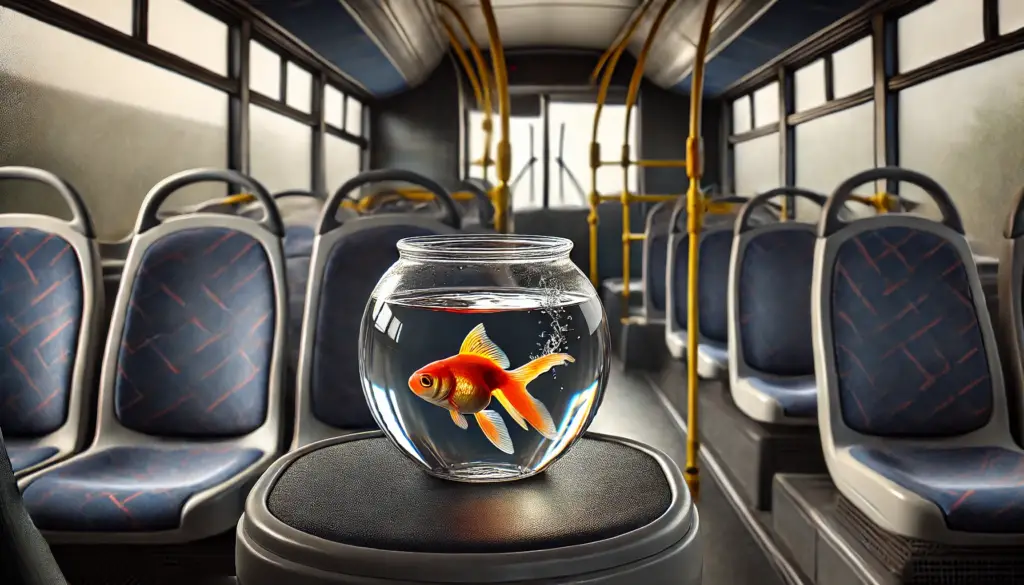
NO FISH IN FISHBOWLS ON PUBLIC BUSSES: In Oklahoma, it’s illegal to carry fish in fishbowls while riding public buses. According to Oklahoma Magazine, this quirky law likely aims to prevent aquatic accidents and keep public transit running smoothly. Imagine the chaos of a sudden bus stop sending poor Nemo flying across the aisle! As one local bus driver quipped, “In Oklahoma, the only schools allowed on buses are the human kind!” So, if you’re planning an aquatic adventure in the Sooner State, you might want to leave your finned companions at home. After all, in the land of red dirt and oil wells, even fish transportation is strictly regulated.
NO BEAR WRESTLING OR HORSE TRIPPING: Oklahoma takes its animal protection seriously, even when it comes to unconventional sports. Oklahoma Statute Section 21-700 prohibits promoting, engaging in, or being employed at a bear wrestling exhibition or a horse tripping event. Violators could face up to a year in jail and/or a fine of $2,000. This law aims to protect animals from cruel and unnecessary harm. As one local rancher joked, “I guess I’ll have to cancel my annual bear-vs-horse rodeo!” So if you’re looking for entertainment in Oklahoma, stick to more traditional sports – leave the bears and horses out of it!
NO WASHING CLOTHES IN BIRDBATHS IN WYNONA: Laundry day in Wynona, Oklahoma, comes with a peculiar restriction. The Value News reports that it’s illegal to wash clothes in a birdbath in this small town. One can only imagine the scene that led to this law: a desperate resident, out of quarters for the laundromat, eyeing the neighborhood birdbath as a potential washing machine. As local bird enthusiast Jim Crow joked, “In Wynona, we like our birds clean and our laundry dirty!” So, if you’re visiting and your clothes need a wash, stick to traditional laundry methods – the local birds will thank you for keeping their baths clean!
CAN’T MAKE UGLY FACES AT DOGS: In Oklahoma, it’s reportedly illegal to make ugly faces at dogs. According to several sources, including Only In Your State and Value News, this quirky law aims to protect our canine friends from potential distress. While the exact origin of this regulation is unclear, it likely stems from concerns about public safety and animal welfare. Imagine the scene: you’re strolling down an Oklahoma street, decide to pull a funny face at a passing pooch, and suddenly find yourself on the wrong side of the law! As one local dog trainer quipped, “In Oklahoma, we take our dogs’ emotional well-being seriously. If you want to make faces, stick to your mirror!” So, next time you’re in the Sooner State and feel the urge to grimace at a Great Dane or scowl at a Schnauzer, remember: keep your expressions friendly, or you might end up in the doghouse with local law enforcement!
NO DOG PARTIES WITHOUT A PERMIT: In Oklahoma, hosting a canine gathering requires more than just treats and toys – you might need the mayor’s approval! According to C-130 Hercules.net, it’s illegal for dogs to congregate in groups of three or more on private property without a permit signed by the mayor. This paw-licy likely aims to prevent neighborhood nuisances and ensure responsible pet ownership. Imagine the bureaucratic process: “Excuse me, Mr. Mayor, I’d like to apply for a Labrador luau license.” As one local dog owner joked, “In Oklahoma, my pup’s social calendar is busier than mine – and requires more paperwork!” So, if you’re planning a puppy playdate in the Sooner State, keep it to a duo, or be prepared to navigate the red tape for your dogs’ right to party. After all, in Oklahoma, it’s not just the humans who need permission to throw a howling good time!
Oregon

NO FISHING WITH CANNED CORN: In Oregon, anglers need to think twice before reaching for that can of corn as bait. According to Pedemonte Law and Robbins Realty Group, it’s illegal to use canned corn as bait for fishing in most Oregon waters. This quirky regulation aims to prevent littering and protect aquatic ecosystems. Imagine the scene: a hopeful angler dumping cans of corn into a pristine river, only to attract more ducks than fish! As one local fisherman quipped, “In Oregon, we like our corn on the cob, not in the lake.” The origins of this law are a bit murky, but it likely stems from concerns about the impact of corn on fish health and water quality. Some believe that fish can’t properly digest corn, leading to health issues. Others worry about the potential for corn to introduce harmful bacteria or alter the natural food chain in Oregon’s delicate aquatic environments. So, if you’re casting a line in the Beaver State, leave the canned goods at home—your fishing license doesn’t cover a side of creamed corn!
NO HUNTING IN CEMETERIES: In Oregon, it’s illegal to hunt in cemeteries, as clearly stated in Oregon Revised Statutes Section 166.645. While this may seem obvious to most, apparently it needed to be spelled out in law. One can only imagine the chaos that led to this regulation: “I swear, officer, I was just paying my respects with my rifle!” This law ensures that Oregon’s cemeteries remain peaceful resting places, not hunting grounds. As a local park ranger joked, “In Oregon, the only shooting allowed in cemeteries is with cameras.” The statute defines “hunting” as it’s described in ORS 496.004, which includes pursuing, capturing, or attempting to capture wildlife. Violating this law is considered a misdemeanor, which could result in fines or even jail time. So, if you’re visiting an Oregon cemetery and spot a deer gracefully leaping over headstones, resist the urge to reach for your hunting gear. After all, in the Beaver State, the only spirits you should be encountering in a cemetery are of the ghostly variety, not the wild game kind!
Rhode Island

NO IMPERSONATING A SEAGULL: In Rhode Island, it’s illegal to impersonate a seagull. While this law might sound like something out of a bizarre comedy sketch, it actually has its roots in concerns over public order. According to Only In Your State, the law likely emerged from a time when authorities wanted to ensure that people weren’t misusing animal impersonations for pranks or to distract people in public spaces. Imagine strolling along the beach when all of a sudden, a person starts squawking like a seagull, sending actual seagulls into a frenzy and potentially creating chaos. You can see how this might have led to some unwanted attention, not to mention the potential for a flock of real seagulls deciding to join in on the commotion. While the law may sound ridiculous today, it reflects Rhode Island’s desire to maintain some order, especially near its beaches and coastal areas. So, if you find yourself in Rhode Island and feel the urge to squawk like a seagull, you might want to consider leaving your best bird impression at home—unless you’re ready to face the long arm of the law for your feathered faux pas.
NO KEEPING CHICKENS IN YOUR MOTORHOME: In Scituate, Rhode Island, there’s a bizarre law that makes it illegal to keep a flock of chickens in your motorhome if you live in a trailer park. Only in Your State reports that while this might sound like an odd rule to outsiders, it actually stems from concerns about the welfare of both the animals and the residents in the park. Chickens can be noisy and messy, and their presence in a confined, mobile space could create sanitation issues and disturb the peace of the neighborhood. Imagine trying to watch TV in your mobile home while your chickens keep clucking and scratching around the place. The origins of this law are unclear, but one can imagine that it probably came into play after a couple of trailer park residents thought it would be a clever idea to keep a small poultry farm in their motorhomes. The constant clucking and the inevitable mess would quickly turn a peaceful mobile home park into a barnyard of chaos. So, if you’re in Scituate and planning a road trip in your RV, make sure you leave your feathered friends behind—or make a proper setup for them outside of your motorhome. You don’t want to break any “cluck-tastic” laws while traveling. After all, in Rhode Island, your home might be mobile, but your chicken coop shouldn’t be.
South Dakota:

HORSES IN PANTS ONLY, PLEASE!: In South Dakota, it’s reportedly illegal for horses to enter fountains unless they’re wearing pants. This quirky law has been mentioned by several sources, including Noelle Neff and InStrideEdition. While the exact origins of this regulation are unclear, it’s become a favorite among lists of weird state laws. The law doesn’t specify what kind of pants horses should wear, leaving plenty of room for creative interpretation. As one local rancher joked, “In South Dakota, we like our horses stylish and our fountains clean!” This peculiar regulation is just one of several unusual laws in the Mount Rushmore State. According to 973KKRC, it’s also illegal to fall asleep in a cheese factory, cause static in Huron, or show movies where police officers are treated offensively. So, if you’re planning a trip to South Dakota with your four-legged friend, remember: horses and fountains don’t mix unless there’s denim involved!
Vermont
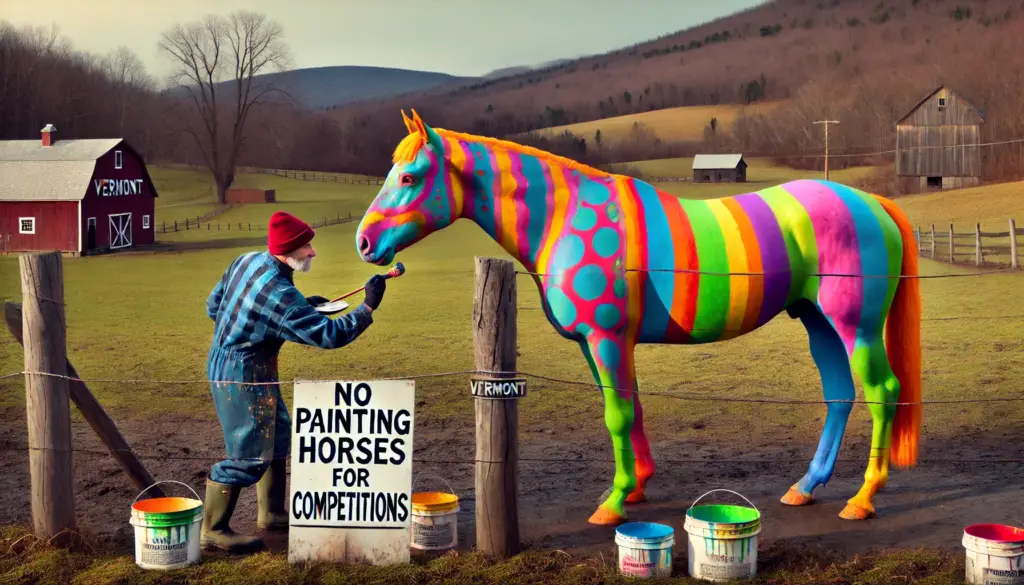
NO PAINTING OR DISGUISING HORSES: In Vermont, it’s illegal to paint or disguise a horse for the purpose of entering a competition. This regulation is tied to preventing participants from gaining an unfair advantage in agricultural competitions. Vermont State Statutes warn that if you’re caught entering a painted horse, you could face up to six months in jail or a fine of up to $500. Can you imagine the absurdity of a bright pink horse galloping around the show ring? While it may sound like something straight out of a cartoon, the law is actually quite serious. So, if you’re planning to enter a horse competition in Vermont, leave the paint and costumes at home—you’ll need your horse to win on its own merits, not its makeover.
NO TYING ANIMALS TO LAMP POSTS – A GIRAFFE-FRIENDLY REGULATION: In Vermont, it’s also illegal to tie any animal to a lamp post. Lawhaha.com notes that while this law seems a bit over-the-top, it’s likely a way for authorities to ensure that animals are treated with respect and aren’t left tethered to public property. The law is vague enough that it could cover everything from a horse to a dog or even, in the most extreme case, a giraffe. Imagine strolling through downtown and seeing someone casually hitching a giraffe to a lamp post while they run inside for a coffee. That would certainly be an unusual scene, but thanks to this law, it’s one that would never happen in Vermont (unless, of course, someone was willing to risk a fine). So, whether you’re walking a dog or a giraffe, be sure to find a better place than a lamp post to tie them up—unless you want to pay a fine and explain your wild behavior to the authorities.
Washington

THE SASQUATCH PROTECTION ACT: In Skamania County, Washington, it’s illegal to harm Sasquatch, Yeti, Bigfoot, or any “sub-species of Homo Sapiens.” This unique law, originally passed as Ordinance No. 69-01 in 1969 and later amended as Ordinance No. 1984-02, is part of the county’s wildlife protection regulations. The legislation was enacted in response to an influx of Bigfoot hunters in the late 1960s, many armed with lethal weapons[1][2]. Under the current law, Skamania County is declared a “Sasquatch Refuge,” and harming a Bigfoot can result in a $1,000 fine and up to a year in jail[2][4]. The ordinance even states that if a victim/creature is determined to be “humanoid,” the case could be pursued under existing homicide laws[1]. As one local ranger quipped, “In Skamania County, we take our cryptozoology very seriously!” Interestingly, neighboring Whatcom County followed suit in 1991, passing Resolution No. 92-043 to establish itself as a Sasquatch protection and refuge area[1]. So, if you’re hiking in the Pacific Northwest and spot a large, hairy figure in the distance, remember: shooting at Sasquatch is not only illegal, it’s also poor forest etiquette.
Wyoming

NO BUNNY PICTURES: Hold onto your cameras, wildlife photographers! Wyoming once had a law that would make even the Easter Bunny hop away in confusion. For years, it was illegal to photograph rabbits between January and April without a special permit. That’s right, these furry models had their own off-season! As reported by Cheezburger, this 1921 rule stated: “It shall be unlawful for any person or persons to photograph any of the game animals or birds of this State during the months of January, February, March, and April, except in the manner hereinafter provided in this section.” Aspiring rabbit photographers had to shell out a whopping $5 for a permit – quite the sum back then! One can only imagine the underground bunny photo shoots that must have taken place. Picture clandestine meetings in dark alleys: “Psst… wanna buy some illegal rabbit pics?” Thankfully, this hopping mad law has since been scrapped, so snap away at those bunnies to your heart’s content. But it does make you wonder: what were those rabbits up to during those winter months that was so top secret? Were they planning a furry uprising? Practicing their Easter egg delivery routes? The world may never know, but at least now we can freely document whatever shenanigans those wascally wabbits get up to year-round!


